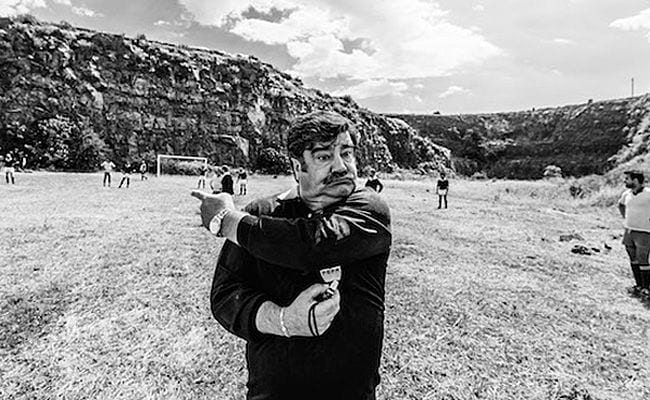
For a film whose many subplots stem from the playing of football matches, The Referee doesn’t teach you much about the sport. But then again, in a way it really does.
Much like the Albert Camus quote that opens the film, “Everything I know of morality, I learned on the soccer field”, ll – The Referee is a satiric film that digs in to human behavior as it fractures, contorts, and unites around the context of competition and fanaticism. Many small narratives emerge – some serious, most comedic.
There’s a blind coach (Benito Urgu), a prodigious star player (Jacopo Cullin), an aspiring national league referee with a penchant for lavish dance numbers (Stefano Accorsi), and one hell of a bitter, small-town rivalry between two teams in Sardinia, Italy.
Director Paolo Zucca is expanding his 2009 short film of the same name to feature length here, and bounces between all of these characters to create a story that’s more centered around a theme and a village than a single, easily definable plot arc.
Zucca chose to shoot in black and white, and makes compelling use of contrast. For the most part, the environment – the grassy hills and cloudy skies – are shot within the same narrow tonal range, leaving stark contrast to the humans that inhabit the setting (an effect that’s never more noticeable than when the rival teams’ jerseys stand out as points of pure white and black in a field of grey). In terms of composition, Zucca clearly takes his inspiration from the work of Sergio Leone – wide landscape shots, stern faces and showdowns.
When it comes to the screenplay, experienced Italian screenwriter and novelist Barbara Alberti (I Am Love) aids the director. Together, they impressively manage to achieve comedy scenes that maintain an air of mystery and drama.
Perhaps the most corrupt game of football ever staged for cinema is played for huge laughs, but a truly moving moment directly follows that laugh-invoking scene when the losing team returns to their town and publicly faces their defeat. These dramatic beats and some delicious camera trickery consistently legitimize The Referee as a comedy for the art house.
Surreal touches complicate our understanding of the story. There’s this nagging return to religious imagery – last suppers, sacrificed lambs, and so on – that make Zucca’s film something you just can’t quite get a grip on. The central rivalry between the opposing football teams could make a great TV comedy series. Meanwhile, a rekindled romance subplot has the sparks to make an entirely different and enjoyable film.
A lot of these successes come from the performances, which make great use of their limitations. With only 96 minutes to track the progressions of half a dozen characters, the actors are cashing in on every minute of screen time. After all, it’s not an ensemble cast but a collection of characters vying for the lead.
Accorsi, who plays the titular referee, is particularly fun to watch as a highly physical performer. Most of the cast has the nonchalant delivery of nonprofessionals – they can sell any line you can write. It’s the type of film that can actually pull off having a blind character angrily yell, “What’re you, blind?!”
The success of Zucca’s skill as a storyteller will depend upon one’s taste. I found his portrayal of football as an infallible crux of society in Southern Italy to be hilarious and kind of poetic, but his reluctance to settle on a single story or character may prove too artistically demanding for some. The Referee is, to the adventurous viewer, a gloriously offbeat feature debut that teases great things to come from Paolo Zucca.


![Call for Papers: All Things Reconsidered [MUSIC] May-August 2024](https://www.popmatters.com/wp-content/uploads/2024/04/all-things-reconsidered-call-music-may-2024-720x380.jpg)



